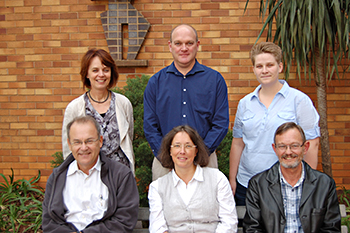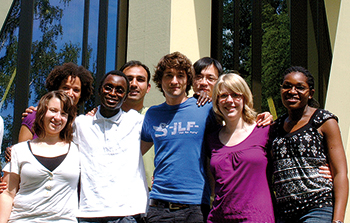Abstract
The project, funded by the Baden-Württemberg Stiftung within its framework Baden-Württemberg-STIPENDIUM for university students – BWS plus, aims to bring students from the technology and innovation region Baden-Württemberg together with students from South Africa so that they can benefit from experience and knowledge regarding real-time geomatics at the two institutions. Today, geospatial tools facilitate incorporating geodata when making decisions to the extent that the use of geospatial tools has become natural to many. At the same time, ubiquitous use of smartphones and the Internet prompts participation. The goal of the project is to explore the differences and similarities in relevance and acceptance of citizen participation considering geodata in Europe and in Africa, and to start a long-term partnership and student exchange programme. Differences in the two university systems will be handled with the required flexibility.
Project background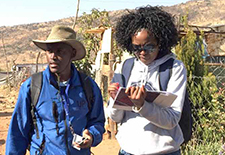
There is a need for geo(infor)maticians in Germany as well as in South Africa, that is, a need for professionals in the field of geodata processing with solid ICT and programming skills. As a rapidly developing field, Geomatics continuously presents new opportunities in engineering, management, econommics and science. This includes the Web 3.0 development, which facilitates the use of geospatial tools and hence encourages citizens to participate and use those very tools. In the developed world, hypes tend to have a negative impact on citizen participation. In developing countries, however, there is a lot of potential for low-cost high-tech approaches.
Baden-Württemberg – South Africa
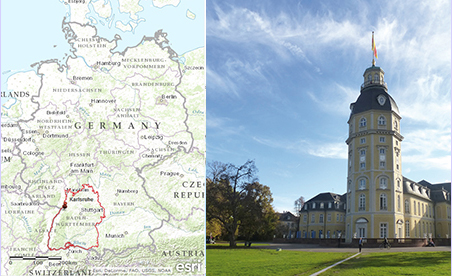 Baden-Württemberg
Baden-Württemberg is the most southwestern state of Germany, bordering France and Switzerland. It promotes itself as a European technology and innovation region. The city of
Karlsruhe is the capital of the Baden region and known as Germany's 'judicial capital' because it hosts all major courts. Founded 300 years ago, it was originally set-up in the shape of a fan with a castle at its centre. The city is placed in the Rhine Valley between the Black Forest to the East and the Palatine Forest and Alsace region to the West.
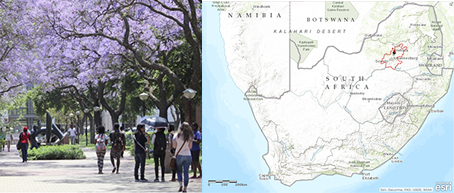 South Africa
South Africa is the most southern country in Africa, bordering Namibia, Botswana, Zimbabwe, Mozambique, Swaziland, and Lesotho. It is commonly referred to as an emerging country on the African continent, i.e. it is leading in regard to economy, society, politics and education in Sub-Saharan Africa.
Pretoria is known for the purple Jacaranda trees and serves as administrative capital of South Africa. It is situated in the Gauteng province between the Highveld and Bushveld regions, just 55 km away from Johannesburg.
Letting students from Karlsruhe and Pretoria work together during the summer schools will allow us to reveal the differences in the relevance and acceptance of citizen participation in Europe and in Africa.
Karlsruhe University of Applied Sciences – University of Pretoria
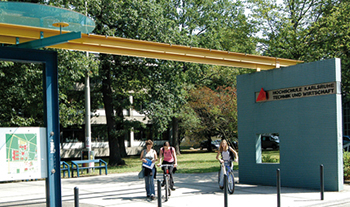 Karlsruhe University of Applied Sciences (HsKA)
Karlsruhe University of Applied Sciences (HsKA) is the largest of its kind in Baden-Württemberg, known for application-oriented education, which leads to readily employable graduates. Approximately 8,300 students, 200 professors, and 450 staff are distributed across six faculties, offering 22 Bachelor and 18 Master study programmes in engineering and economics. For its applied research, the university was able to obtain 5.66 Mio € of third-party funds in 2014. The
Faculty of Information Management and Media (IMM) has particular strengths in the integrated application of geographic information systems, remote sensing and visualization, e.g. in the environmental field. The faculty is proud of having been labelled as an Esri Development Center.
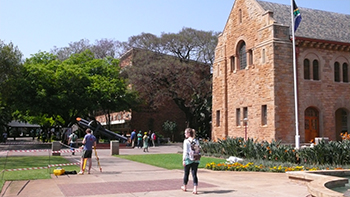
The
University of Pretoria (UP), together with five other South African universities, is ranked among the top 10 universities in Africa. Approximately, 62,300 students, 1,300 lecturers/researchers, and 2,000 staff are hosted on 7 campuses. They form nine faculties and one business school, which offer 1,213 study programmes (166 at Bachelor-level). UP is a leading research-intensive university in Southern Africa. The Department of Geography, Geoinformatics and Meteorology (GGM), and more particularly the
Centre for Geoinformation Science (CGIS) focuses its research on spatial infrastructures, addressing and geovisualization and hosts an ICA–OSGeo–ISPRS Lab, promoting free and open source software for geospatial applications.
The education and training in Geo(infor)matics at HsKA and UP has many similarities. In this project the focus will be on the use of latest technologies and approaches in free and open-source software for geospatial, mobile GIS, Web services, real—time monitoring and visualization, crowd-sourced information and gamification.
Project Goals
Five project goals have been identified:
- Promoting the partner universities (UP, HsKA), their settings and profiles by means of summer schools.
- Drawing up, signing and living an official partnership agreement (HsKA – UP) for long-term manifestation of the project at both institutions.
- Adaptation of the curricula at HsKA and UP for a problem-free student exchange (targeting Geoinformatics Honours students to spend time at HsKA, and International Geomatics Master students to spend time at UP).
- Establishing an intern exchange programme with the help of local organizations in the public and private sector.
- Working on a standard for jointly supervised research projects by students.
Main Project Activities and Opportunities for Students
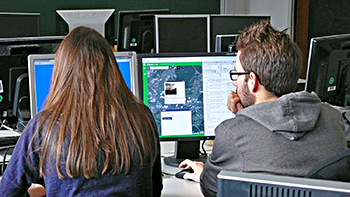
For initiating a sustainable cooperation between HsKA and UP we focus mainly on two measures:
- Study and research trips of 4 under- and postgraduate students from each university: to extend and train students' professional competencies, to promote inter-cultural experiences and thus stimulate appreciation for other societies.
- Two summer schools on participatory sensing with 16 participants: advertising the respective strengths in the geomatics field of the two institutions and testing of latest developments.
1st Summer School on Participatory Sensing in Karlsruhe
- Topic: Environmental protection through citizen integration
- Aim: to support opportunities for stronger participation and active learning
- in Karlsruhe, 17-30 July 2016 (Blog, Video clip)
- 18 participants, incl. 8 students and 2 staff members from UP
- 2 weeks of lab work at HsKA (EDC) plus visits and testing in the nature conservation area 'NSG Rastatter Rheinaue'
- Socializing programme, incl. a visit to Heidelberg and its famous castle
2017 Winter School on Participatory Sensing in Pretoria
- Topic: Planning in informal settlements
- Aim: to empower citizens to take responsibility through active participation
- in Pretoria, 23 July - 5 August 2017 (Blog, Video clip)
- 18 participants, incl. 7 students and 2 staff members from HsKA
- 2 weeks of field work in the 'Alaska' informal settlement in Mamelodi, Pretoria East and lab work at UP (CGIS)
- Socializing programme incl. a visit to the Rhino & Lion Reserve and Freedom Park
Benefits for the Students
- Raising interest among German students for study visits in Africa: i.e. diminishing biased opinions about living and working in Africa; HsKA to network with a well-known South African University thus closing a gap.
- Financial means for students from South Africa: to experience Baden-Württemberg as an excellent study and research location with much know-how and great living conditions.
- Individual support and programmes tailored to the needs of the individual student: for Bachelor, Honours, Masters or doctoral students; covering taught courses, practical semesters, project work / final theses, or research.
The project is also a contribution to the
International Map Year 2015-2016
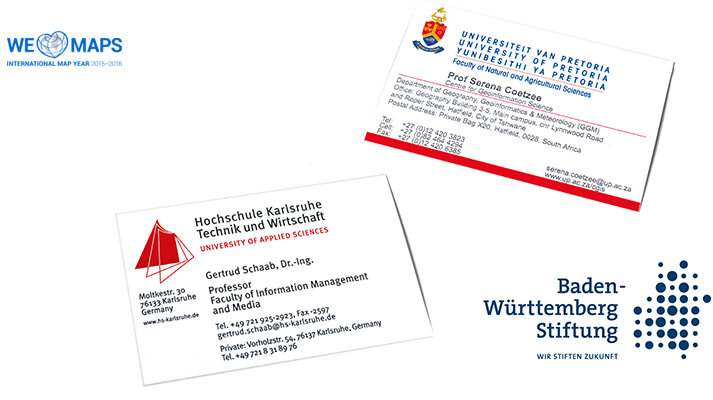
last modified on: 2 March 2016


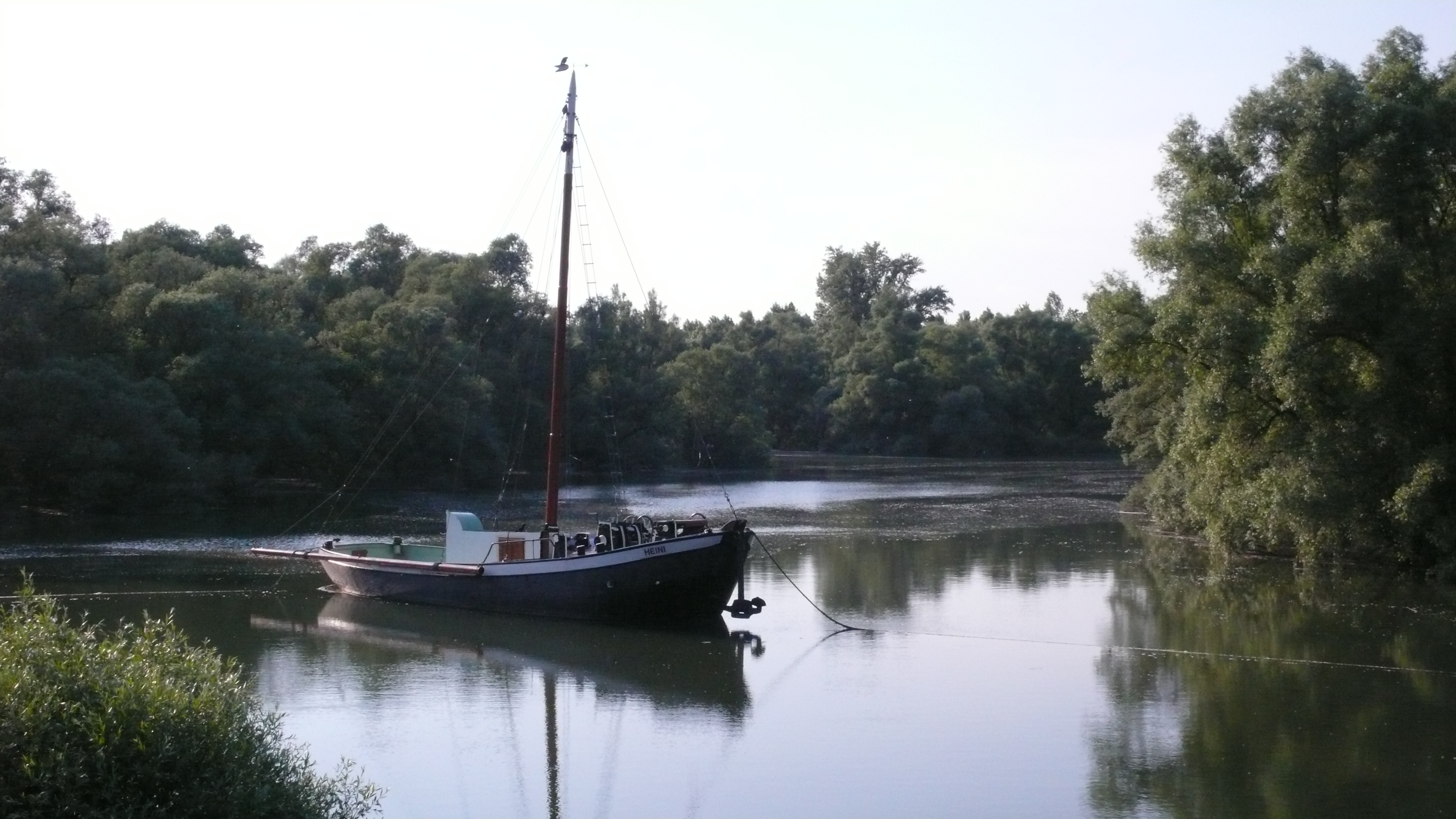

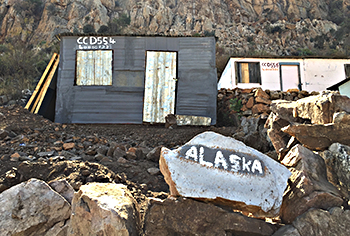

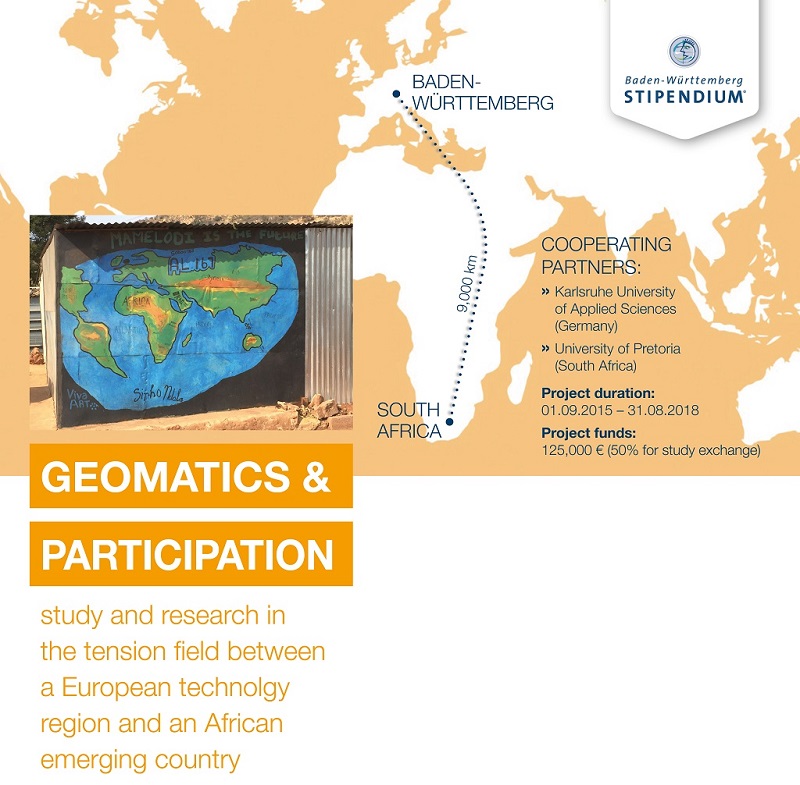




 The
The 